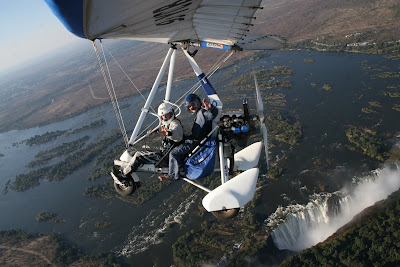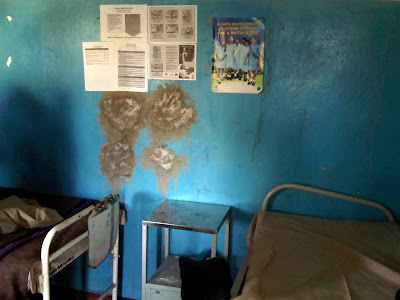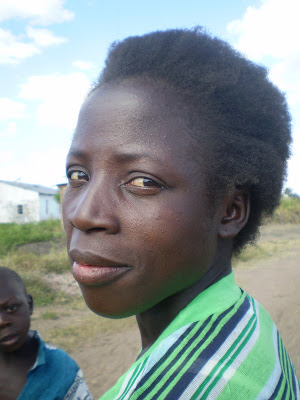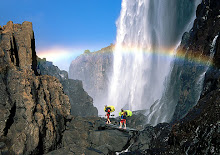Part of the excitement of travel is the unexpected and in Africa, it is best not to have expectations at all. Rather than getting overwhelmingly frustrated every time something goes awry, the most weathered travelers will say “TIA”….this is Africa.
Friday, June 5
Our team returned from the final health facility visit in Petauke at noon. I made a last minute decision the night before to not return to Lusaka with the group and instead hop on a bus and head to Mfuwe, home of South Luangwa National Park….supposedly one of the best game parks in Africa. The map made it look like a relatively easy journey – I had heard a two hour bus ride to Chipata, followed by another 2-3 hour mini-bus ride to Mfuwe. However, most musungus fly into Mfuwe, so I didn’t have much to go on and when you ask locals, they always seem to underestimate the time and distance.
After the final site visit, I had the driver drop me off at the junction where the buses to Chipata passed through. I sat on my backpack under a tree with a group of men, who were also waiting there with coolers of drinks to sell passengers as the buses passed through. I asked how soon till the next bus to Chipata and was told very soon…
After the first hour of waiting, and a countless number of people asking if I was Peace Corps (apparently Peace Corps volunteers are the only other musungus to make it to this part of Zambia), two German friends from Lusaka rode by on bicycles. These guys are riding from Cape Town to Nairobi to raise funds for an orphanage, which one of them started. They have definitely made the top of my list for coolest people I have I met in Lusaka. I jumped up yelling, “Emmanuel” and they both steered of the road, equally surprised to see me in this town so far off the beaten path. We chatted for a bit and then they proceeded, leaving me to wait for the bus that would nearly run them off the road shortly after….
Anyways, two hours after being told “very soon”, the bus arrived. I shoved into a seat near the front and waved goodbye to all of my new bus stop friends as we drove away. This first leg of the trip was rather uneventful, except for the unfortunate incident in which we ran over a rather large pig. Because of my front and center position on the bus, I was able to see the play-by-play of Wilbur’s demise.
Given our later than anticipated departure, I was pleased to find a minibus to Mfuwe “ready” to leave. The dirt roads in between the two towns, with notorious potholes and a propensity for animal visitors, are not recommended to travel at night. However, since it was only 4:30pm and the man who sold me a seat promised we would be leaving in five minutes, I figured I was in the clear. But then again, TIA.
Over an hour later, we finally rolled out of the parking lot. I glanced at my watch, quickly calculating how many minutes of daylight were left – not enough. In addition, with each revolution of the tires, the entire vehicle sounded like it was going to fall apart. They had also piled so much weight on the roof that it actually started to sag in the middle and only one door was functioning. (It was all starting to make sense why most musungus fly). We didn’t make it more than 500 meters and the driver pulled into an auto shop, claiming he needed to quickly fix our spare tire. After 30 minutes in the shop, I phoned the lodge where I had made a reservation to inform them I would be arriving later than planned. At this point the men were take turns hitting the tire with a sledge hammer. While I am no mechanic, their method seemed counterproductive. TIA.
They finally got their fill of hammering the tire and put it back in the vehicle. It was 6:30pm when we left the auto shop and what little trace of daylight remained was wasted when the driver decided he needed bread for the journey and made yet another stop.
When it was clear that we were on our way, I relaxed, well sort of; my knees were smashed into the seat in front of me because they had added another bench to the minibus to maximize passengers, consequently minimizing leg room to that only fit for a child. Needless to say, it was probably the most uncomfortable position I could have possibly been in for a 3 hour pot-hole ridden road trip. I turned to check in on the family behind me…a mother and her three small children, who I had spent some time playing with during the long waits. The mother sat with one child on her lap and the second nestled into her side. The third, a boy around 4 or 5 years old, was left with very little room and was trying to rest his head against the window. Being a chronic car sleeper – I am familiar with all positions and the “head against glass window on bumpy road” is probably the worst. While, I had no leg room, I did have a bit of space next to me, so I signaled to the mother that the boy should sit with me. She couldn’t understand my signals, but didn’t protest as I lifted him over the seat. However, he stared at me with bulging eyes. Everyone else in the minibus was also staring...something that would become quite commonplace by the end of the journey. Nonetheless, once I convinced him to lay his head on my lap, he was asleep in 30 seconds.
About 1.5 hours into the drive, the vehicle died. I nervously glanced at my fellow passengers and in unison, we all checked our cell phones for reception…and of course, there was none. (cue horror film music) The same three stooges who were using the sledge hammer on the tire earlier, attempted to fix the vehicle in a similarly asinine way, running around and banging things. Again, while I am no mechanic, it can’t be a good sign when someone starts to hit the dashboard in an attempt to get the car to turn on. It was at this point that I also noticed that they had been starting the car all along by touching two wires together. TIA.
Two other cars passed us on the road and no one made any attempt to flag them down. Deciding that I was not going to be complacent anymore and needed to be ready when the next car drove by, I started to make my way out of the vehicle. Since I had no close access to a functioning door, this required elaborate movements over the backs of seats and heads of people. Finally free and standing on the road, I noticed all of the other passengers eyeing me weirdly from inside. I then noticed headlights in the distance. As the car approached, I ran out into the road and flapped my arms like a crazy woman. As it came closer, I realized it wasn’t slowing down and was in fact racing towards me. I threw my body into the ditch, simultaneously yelling “stopppppppppp” as it zoomed by. Now all of the other passengers had their faces pressed against the window glass and shaking their heads.
Brushing the dirt off my pants, I looked up to see the vehicle moving forward. I had to run and catch it, but all the while, I was yelling “woohoo……wooooooo”, and punching my fist in the air.
The next three hours of the journey, albeit bumpy, were without interruption. We dropped off passengers along the way, with finally just the family I mentioned early, a young guy and me remaining. We arrived at the family’s home and I had to gently wake my sleeping friend. The children, still half asleep were deposited on the side of the road, meanwhile their father, who came to meet the minibus, was having a heated discussion with the driver. I figured he was probably angry because they were so late in dropping off his young children and wife. However, the driver was actually demanding more money and refused to give them their luggage unless he was given another 10,000 kwacha ($2), explained Chilufya, the other remaining passenger. However, the father did not have any more money and had paid the price negotiated, which the driver was now denying. The father looked very worried and the children looked exhausted and scared. I searched for my headlamp, found the 10pin in my bag, and handed it to the driver. As for what happened next, I can only say that my thinking was clouded by all of the earlier events and while I am not proud of my behavior, it seemed completely rational at the time. So anyways, I handed the driver the 10 pin and then I asked Chilufya to translate, “Take the money, but you should know that I think you are the biggest asshole I have ever met and I have met a lot of assholes. I wrote down your license plate number and I am going to report you and this piece of shit bus to the police. And if they don’t do anything, I am going to call a friend up north, who knows just the right person to take care of you”. (Through stories from colleagues, I knew that everyone was afraid of the black magic in the north). Chilufya shook his head and mumbled something to the driver and his minions. I don’t think he told them what I said because Chilufya is clearly far smarter me and recognized that I still needed to be dropped off safely.
Which they did at the fueling station in Mfuwe and I was then ushered into an open-air safari vehicle by a guide from the lodge who had been waiting over two hours for my arrival. The camp where I made a reservation was 5 km off the tarmac and situated right outside the official park. However, since there are no fences separating the park from non-park, animals roam freely between the two.
As we turned off the tarmac, I was already well into grilling the guide about his life, dreams and aspirations… He was so caught up in my interrogation that he nearly ran smack into an elephant. The sleeve of my shirt practically brushed the elephant’s behind. He slammed on the breaks and I looked to the left where eight huge elephants were eating leaves, all within reach of my outside arm. TIA.
We finally made it to camp and I was given my own chalet, with a porch that looked out to the Luagwa River, home to more hippos than any other place in Africa. Finally, at midnight I crashed into bed and fell asleep listening to hippos call across the water.
Saturday, June 6
Before my alarm could do its job five hours later, I was jolted awake by the sound of very fast running. Heart racing, I peered out the window, but saw nothing. I made my way to the main lodge and Andrew, the safari guide, asked if I heard the four lions running by a half hour earlier… TIA!
Andrew and I set off for the morning drive, accompanied by an aunt-niece duo from Oregon. This was their 11th drive of the week, so Andrew asked if there was anything I wanted to see in particular. I told him I liked everything… However, the duo really liked everything and suddenly we were stopping for every damn bird in the park and having a full discussion about its mating and nesting behaviors. I know I should appreciate birds, just like I know I should appreciate modern art – but I don’t. Sure we saw plenty of elephants and giraffe, and even a herd of 200 buffalo, but we seemed to be stalking robins and love-birds, and I really wanted to see some lions. I had given up hope, tuning out the discussion about the physiology of the woodpecker, when Andrew abruptly threw the truck into reverse. He pointed to the right….and there, basking in the sunlight, were 6 lions, all within spitting distance of the safari vehicle. He explained how the women do all of the hunting and provide for the pride…….I told him it sounds like the rest of Africa and he laughed, agreeing. Andrew situated us even closer and I spent the next twenty minutes getting a lion’s share of photos for the day.
After the lion encounter, we had tea in a field of impalas and set off for the journey back to camp, passing elephants, giraffes and zebra along the way. I had a five hour break between game drives, so went to hang by the pool, which was near the river, which was full of hippos. TIA.
The night drive was even more incredible. The two other passengers spoke only enough English to say they wanted to see a leopard (a very elusive animal), which left lots of opportunity for me to talk to Phillemon, the guide and Mago, the spotter. The drive started early enough for a couple hours of daylight, sundowners in a picturesque location, followed by two hours of spotting nocturnal animals with a spotlight. Five minutes into the drive we passed a field with antelope, warthogs, baboons and a variety of other animals. It seriously looked like a scene out of the Lion King and I am embarrassed to say that I started singing circle of life without even realizing it. There was nearly a full moon, which Phillemon said made it even more difficult to spot a leopard….we saw plenty of hyenas though, definitely one of the ugliest animals out there. Just as the night drive was winding down and Phillemon pointed out the Southern Cross, lo’ and behold, Mago spotted a leopard. It was absolutely amazing – creeping through the grass, stalking a nearby impala. While we wanted to wait for the kill, we were ruining the leopard’s game by sticking around.
Returning to camp at 9pm, I was able to get a few hours of sleep before catching a 2am bus back to Lusaka. This time my alarm was intercepted by the sound of a hippo munching on grass. I peered out the window and it was nearly on the porch...fortunately, it had returned to the river before I needed to exit. I had been warned not to startle a hippo. I jumped in a safari vehicle and was escorted back to town, passing several hyenas on the way. We had heard lions howling in the night, as well as the alarm calls of puku and baboons. Now with hyenas in the area, it was clear that the lions had found dinner in the camp during the night. TIA.

















































